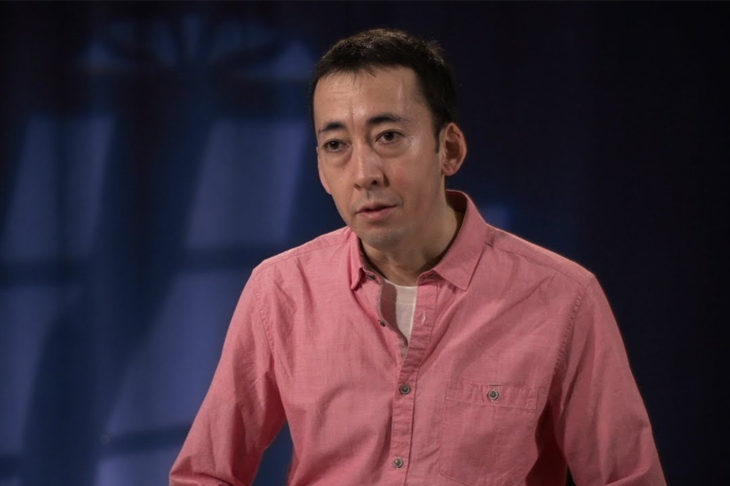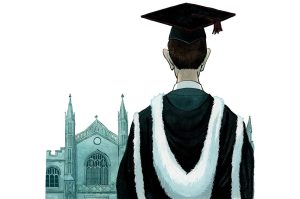‘There is a place in academe for scholarship that responsibly weighs the benefits and costs to children of sex with adults,’ says Lisa Ruddick, professor of English at the University of Chicago. Yes, you did read that right. A professor at one of the US’s top universities identifies ‘benefits’ for children in having sex with adults. She also thinks that ‘academe’, which is French for people like her, is the place to do it.
Ruddick was prompted to these lofty reflections by a 2005 article in the journal ELH: English Literary History by Kevin Ohi. Kevin Ohi is now a professor at Boston College, specializing in ‘queer theory, aestheticism and decadence.’ His books include Innocence and Rapture: The Erotic Child, and his webpage says he also enjoys ‘solitude’ and ‘narrative perspective and desire’. I hope he remembers to clear his history and wipe down his keyboard afterwards.
This is not the only pornographic element to Ohi’s article. You can’t read it online, unless you pay for it or have a group membership, in this case through an academic affiliation. Thus the mental and financial paywall of the specialized academic website resembles that of the specialized porn website.
Ohi’s article uses a short story by Henry James, the most sexless of writers, as a justification for the rape of minors. Lisa Ruddick, despite spending her entire professional life in universities, hasn’t entirely lost her moral compass:
‘This article proposes that if one faces a choice between having sex with children and protecting them, “perhaps one should let oneself desire the child, and — relinquishing the gratifications of protection — let the child die.” Sexually precocious children should “perhaps” be allowed a death of “innocence” that will supplant the pleasures of childhood with “other pleasures” delivered by adult lovers. James’s short story supposedly conveys this moral. But the lesson is said to apply in real life as well, wherever adults might be tempted to issue “calls for the protection of children.” The story is said to reveal “the dire results of protecting children from desire”—anywhere. For today’s anti-pedophile perpetrates the “potential violence” of “speaking on [children’s] behalf.”’
Professor Ruddick made this suggestion in a 2015 essay for The Point, called ‘When Nothing is Cool.’ The point of her essay was that grad students in English suffer from ‘a malaise without a name’, because their ‘socialization to the discipline’ has left them with ‘unaccountable feelings of confusion, inhibition, and loss.’ We can only guess why young people who enroll in a program because they enjoy reading novels feel a bit glum when their professional training resembles the hazing process of an especially punitive cult.
Ruddick’s essay is a case in her point. She identifies that the Humanities have lost all sense of humanity, and that intellectual commissars have turned them into boot camps for loony radicalism of every kind. But she is one of the ‘corps of compliant professionals’ that this system produces. She admits she’s uncomfortable with intellectual nihilism, but she’s scared to admit that she’s still captive to ‘bourgeois ideology.’ So she quotes herself into a submissive posture.
She cites fanatic impostors like Judith Butler, a supporter of Hamas who calls herself a feminist, and Fredric Jameson, who spews out Marxist drivel like silage from a muck spreader. And, instead of naming Kevin Ohi as a creep advancing a criminal agenda in the name of a dead novelist and daft theories, she indulges him, and says that his sick ideas should be given a cost-benefit analysis, so we’ll know how children will ‘benefit’ from having sex with adults, providing, of course, that the adult doesn’t ‘let the child die’.
Lisa Ruddick will probably say she didn’t mean it. She probably didn’t, because this sort of equivocating is a reflex in the Humanities. She will recant, or say she’s been misunderstood. But look at who else has read and approved of Kevin Ohi’s essay, or endorsed its publisher:
- The English Literary Review is published by Johns Hopkins University Press. Its current editor, Douglas Mao (PhD, Yale 1993), is a Columbia professor, an erstwhile president of the Modernist Studies Association, and recipient of a Guggenheim Foundation Fellowship. The ELH’s content is peer-reviewed by professors. So was Kevin Ohi’s published work when he applied for a highly competitive post at Boston College.
- The Point, which published Ruddick’s essay, is a cod-academic magazine established by University of Chicago grad students in 2008, and edited by its founders. Its motto is ‘Question received ideas.’ Its website carries endorsements from James Wood, Mark Lilla and the TLS.
- Ruddick’s essay was published in The Future of Scholarly Writing: Critical Interventions (2015), a peer-reviewed book published by the respected academic outlet Palgrave Macmillan. Like The Point’s editors, the book’s editors, Angelika Bammer and Ruth-Ellen Boetcher Joeres, retained Ruddick’s ‘cost-benefit’ assertion. Angelika Bammer is a professor at Emory University, and the author of Respectability and Deviance. Ruth-Ellen Boetcher Joeres is an emeritus professor at the University of Minnesota.


















